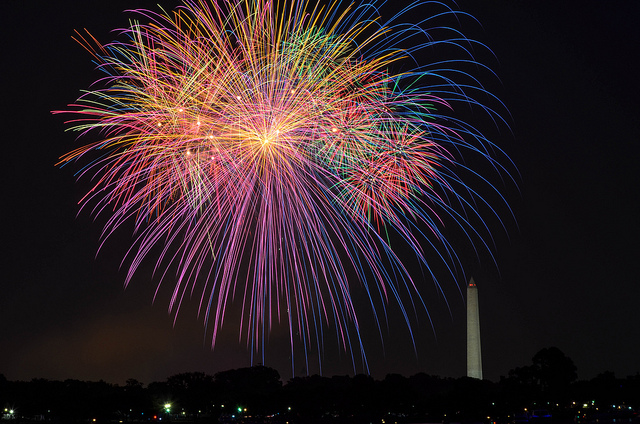 This weekend, while you are enjoying the Independence Day pageantry and intricate fireworks displays, keep in mind that there are wounded warriors here in the United States who really hate fireworks.
This weekend, while you are enjoying the Independence Day pageantry and intricate fireworks displays, keep in mind that there are wounded warriors here in the United States who really hate fireworks.
Post Traumatic Stress Disorder is often a debilitating psychological injury that can be exacerbated by events or experiences similar to those that caused the PTSD in the first place. Fireworks involve loud and sudden noises, along with brilliant flashes of light. They can trigger memories that–frankly–are not welcome in the mind of a PTSD sufferer.
So, why do we celebrate Independence Day with fireworks? My favorite explanation comes from Forrest Wickman’s Slate article, The Rockets’ Red, White, and Blue Glare:
Because John Adams wanted us to. Before the Declaration of Independence was even signed, he envisioned fireworks as a part of the festivities. In a letter to Abigail Adams on July 3, 1776, he wrote that the occasion should be commemorated “with Pomp and Parade, with Shews, Games, Sports, Guns, Bells, Bonfires and Illuminations from one End of this Continent to the other from this Time forward forever more.” The first commemorative Independence Day fireworks were set off on July 4, 1777. The Pennsylvania Evening Post wrote that in Philadelphia, “The evening was closed with the ring of bells and at night there was a grand exhibition of fireworks (which began and concluded with thirteen rockets) on the Commons, and the city was beautifully illuminated.” The paper noted that “Everything was conducted with the greatest order and decorum, and the face of joy and gladness was universal.”
And we should keep celebrating the Fourth of July. With fireworks. Only, we should be mindful that some of our neighbors might not agree that fireworks evoke universal “joy and gladness.”
The good news is that there are compassionate groups trying to help veterans with PTSD. Time magazine ran a story about Military with PTSD, a charitable organization “dedicated to helping military and veteran families understand each other.” This group ran with a good idea: yard signs reading, “Combat Veteran Lives Here: Please be Courteous with Fireworks.” Apparently, the signs are so popular that the waiting list far exceeds the 2,500 signs that Military with PTSD printed for 2015.
To me, the message is clear and succinct: please be courteous. And as CNN reported, Military with PTSD suggested that courtesy could include something as simple as a “heads-up” before firing fireworks “on the dates around July 4.”
Other sufferers of PTSD may appreciate the courtesy, too. Defense Base Act contractors who return from Iraq and Afghanistan with PTSD also have the same problem with fireworks. The contractors afflicted with PTSD also run the risk of resurgence in response to an unplanned, unscheduled fireworks display.
So, while celebrating this weekend, keep PTSD sufferers in mind. John Adams may have wanted “illuminations from one End of this Continent to the other,” but he may not have envisioned the ubiquity of fireworks in modern times. Planned fireworks shows are one thing; but a bottle rocket war between the neighborhood teens is something completely different.
Photo courtesy of Flickr user m01229.
